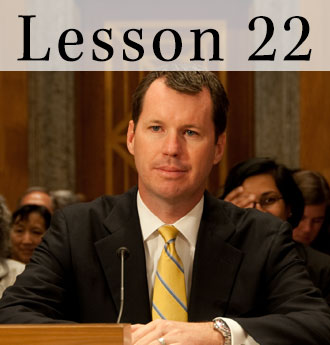The Resource Center » Level 3 » Unit 4 »
Lesson 22: How Does Congress Perform Its Functions in the American Constitutional System?

Lesson Purpose
When you have finished this lesson, you should be able to describe the role of rules, committees, and political parties in the organization and operation of Congress. You should be able to describe the process through which proposed legislation becomes law. You should be able to identify the primary sources on which members of Congress rely for information in the lawmaking process and to explain the importance of Congress's inherent power to investigate. You also should be able to explain why compromise is required in the deliberative process. Finally, you should be able to evaluate, take, and defend positions on how Congress functions and whether it should streamline its procedures.
Lesson Objectives
- describe the role of rules, committees, and political parties in the organization and operation of Congress,
- describe the process through which proposed legislation becomes law,
- identify the primary sources on which members of Congress rely for information in the lawmaking process and to explain the importance of Congress’s inherent power to investigate,
- explain why compromise is required in the deliberative process, and
- evaluate, take, and defend positions on how Congress functions and whether it should streamline its procedures.
Lesson Terms
Lesson Biographies
Lesson Court Cases
Case Summary
With the National Labor Relations Act of 1935, Congress determined that labor-management disputes were directly related to the flow of interstate commerce and, thus, could be regulated by the national government. In this case, the National Labor Relations Board charged the Jones & Laughlin Steel Co. with discriminating against employees who were union members.
Question(s)
Was the act consistent with the Commerce Clause?
Answer(s)
Yes. The Court held that the act was narrowly constructed so as to regulate industrial activities which had the potential to restrict interstate commerce. The justices abandoned their claim that labor relations had only an indirect effect on commerce. Since the ability of employees to engage in collective bargaining (one activity protected by the act) is "an essential condition of industrial peace," the national government was justified in penalizing corporations engaging in interstate commerce which "refuse to confer and negotiate" with their workers.
See: The Oyez Project, NLRB v. Jones & Laughlin Steel Corp., 301 U.S. 1 (1937)
Lesson Primary Sources
An agenda to reform many aspects of American national government championed by Republican Speaker Newt Gingrich. It borrowed language from Ronald Reagan's 1985 State of the Union address and its supporters credit it with both unifying the Republican party and securing the 1994 midterm election.






